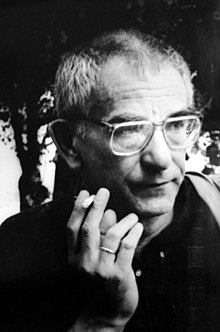Krzysztof Kieślowski
Krzysztof Kieślowski (27 June 1941 – 13 March 1996) was an influential Polish art-house film director and screenwriter known internationally for Dekalog (1989), The Double Life of Véronique (1991), and The Three Colors Trilogy (1993–1994). Kieślowski received numerous awards during his career, including the Cannes Film Festival Jury Prize (1988), FIPRESCI Prize (1988, 1991), and Prize of the Ecumenical Jury (1991); the Venice Film Festival FIPRESCI Prize (1989), Golden Lion (1993), and OCIC Award (1993); and the Berlin International Film Festival Silver Bear (1994). In 1995 he received Academy Award nominations for Best Director and Best Writing. In 2002 he was listed at number two on the British Film Institute's Sight & Sound Top Ten Directors list of modern times.

Quotes
edit- If there is anything worthwhile doing for the sake of culture, then it is touching on subject matters and situations which link people, and not those that divide people. There are too many things in the world which divide people, such as religion, politics, history, and nationalism. If culture is capable of anything, then it is finding that which unites us all. And there are so many things which unite people. It doesn't matter who you are or who I am, if your tooth aches or mine, it's still the same pain. Feelings are what link people together, because the word "love" has the same meaning for everybody. Or "fear", or "suffering". We all fear the same way and the same things. And we all love in the same way. That's why I tell about these things, because in all other things I immediately find division.
- I don't make biographical films … None of the films is about me. Not a single one. None. I have my life and I'll simply never tell anyone what part of me is in my films. I won't ever tell anyone about that, because I don't consider that to be anyone else's business but mine. Nobody will guess where and how and in what way I fill them with my own pains. And that's an intimate aspect of my work that I keep to myself. … I won't even tell my wife — ever.
- As quoted in "Kieślowski's Many Colours" by Patrick Abrahamsson, in Oxford University Student newspaper (2 June 1995)
Quotes about Kieślowski
edit- Having followed Kieslowski around Oxford for a day, heard him speak twice, and interviewed him in private, I still find myself in search of the Kieslowski whose name appears at the beginning of some of the most remarkable films in our otherwise cinematically uninspired age.
Kieslowski's rise from relative obscurity, to being universally recognised among the ranks fo the world's most gifted living film-makers, was meteoric. … Listening to Kieslowski, one is struck by his self-professed lack of faith in the medium with which he has come to address what many hold to be the spiritual malaise of our times. He has become known as someone who finds redemption in our common humanity. In particular, he bemoans the camera as a "stupid" instrument, which, unlike the novel, "cannot show a character's inner feelings."
Asked halfway through the Union speaker meeting whether he even likes films, Kieslowski deadpans "No". When questioned as to his greatest cinematic inspirations, he replies: "Life and Literature." As for Hollywood directors whom he admires, he thinks long before coming up with Chaplin and Hitchcock.
- I am always reluctant to single out some particular feature of the work of a major filmmaker because it tends inevitably to simplify and reduce the work. But in this book of screenplays by Krzysztof Kieślowski and his co-author, Krzysztof Piesiewicz, it should not be out of place to observe that they have the very rare ability to dramatize their ideas rather than just talking about them. By making their points through the dramatic action of the story they gain the added power of allowing the audience to discover what's really going on rather than being told. They do this with such dazzling skill, you never see the ideas coming and don't realize until much later how profoundly they have reached your heart.
External links
edit- Krzysztof Kieślowski on IMDb
- Krzysztof Kieślowski profile at Culture.PL
- Senses of Cinema: Krzysztof Kieślowski
- Criterion Collection Essay by Colin MacCabe
- Kieślowski's "Three Colours" Trilogy at the Galilean Library
- Transcript from 1994 Seminar by Kieślowski on "Directing actors"
- Interview with Agnieska Holland on Her Friend and Colleague Kieślowski
- Profile on Krzysztof Kieślowski
- Three Colours Trilogy at Culture.PL
- "Kieslowski Before Kieslowski" — essay by Tim Cawkwell
- "Kieslowski Life Timeline by Tim Cawkwell
- Overview of Kieślowski works at Filmref.com
- The Double Life of Veronique :: The Art of Visual Poetry (2016) by Charles Kincaid